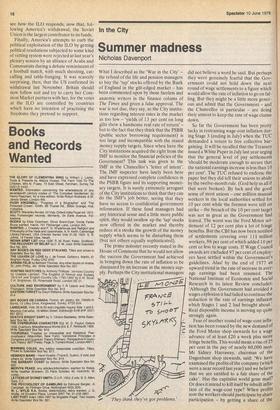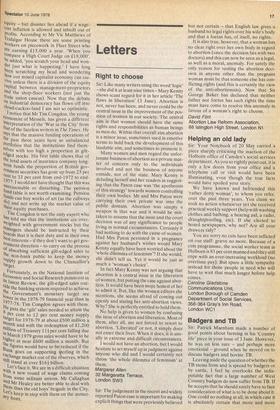In the City
Summer madness
Nicholas Davenport
What I described as the War in the City' — the refusal of the life and pension managers to buy the 'tap' stocks offered by the Bank of England in the gilt-edged market — has been commented upon by those faceless and anaemic writers in the finance colums of The Times and given a false approval. The war is not due, they say, to the City institutions regarding interest rates in the market as too low — 'yields of 13 per cent on long gilts show a handsome real rate of return' — but to the fact that they think that the PSBR (public sector borrowing requirement) is too large and incompatible with the stated money supply targets. Since when have the City institutions acquired the right from the IMF to monitor the financial policies of the Government? This task was given to the IMF in the Chancellor's 'letter of intent'. The IMF inspector have lately been here and have expressed complete confidence in the PSBR figure and its supporting monetary targets. It is surely extremely arrogant of the City institutions to think that they can do the IMF's job better, seeing that they have no access to confidential government information. If these fund managers had any historical sense and a little more public spirit, they would swallow up the 'tap' stocks now offered in the market and thereby reduce at a stroke the growth of the money supply which seems to be disturbing them (but not others equally sophisticated).
The prime minister recently stated in the House of Commons that he would not allow the success the Government had achieved in bringing down the rate of inflation to be ' dissipated by an increase in the money supply. Perhaps the City institutional managers did not believe a word he said. But perhaps they were genuinely fearful that the Government could not hold down the next round of wage settlements to a figure which would allow the rate of inflation to go on falling. But they might be a little more generous and admit that the Government — and the Chancellor in particular — are doing their utmost to keep the rate of wage claims down.
So far the Government has been pretty lucky in restraining wage-cost inflation during Stage 3 (ending in July) when the TUC demanded a return to free collective bargaining. It will be recalled that the Treasury issued a White Paper in July last year urging that the general level of pay settlement's 'should be moderate enough to secure that the national earnings increase is less than 10 per cent'. The TUC refused to endorse the paper but they did tell their unions to abide by the twelve-month rule. (God help us all if that were broken). By luck and the good sense of most unions — one million manual workers in the local authorities settled for 10 per cent while the firemen were still on strike — the breach of the 10 per cent target was not as great as the Government had feared. The worst was the Ford Motor settlement of 12 per cent plus a lot of fringe benefits. But the CBI has now been notified of settlements covering over 114 million workers, 86 per cent of which added 10 per cent or less to wage costs. If Wage Council awards are excluded 97 per cent of employees have settled within the Government's guidelines. Alas! by the end of 1977 an upward trend in the rate of increase in average earnings had been resumed. The National Institute of Economic and Social Research in its latest Review concludes: 'Although the Government had avoided a wages explosion it had failed to continue the reduction in the rate of earnings inflation which Stages 1 and 2 had brought about.' Real disposable income is moving up quite strongly again.
Fear of another round of wage-cost inflation has been roused by the new demand of the Ford Motor shop stewards for a wage advance of at least L20 a week plus more fringe benefits. This would mean a rise of 25 per cent in the pay of nearly 60,000 men. Mr Sidney Harraway, chairman of the Dagenham shop stewards, said: 'We have examined the profits of the company (which were a near record last year) and we believe that we are entitled to a fair share of the cake'. Has the capitalist world gone mad? Or does it intend to kill itself by inbuilt inflation of the wage-cost type? When profits soar the workers should participate by share participation — by getting a share of the equity — but disaster lies ahead if a wage cost inflation is allowed and inbuilt out of Profits. According to Mr Vic Matthews of
Trafalgar House there are some printing Workers on piecework in Fleet Street who
are earning £15,000 a year. 'When you e,onnpare a High Court Judge on £18,000', 'le added, 'you scratch your head and won,der just what is happening.' I have long been scratching my head and wondering how our mixed capitalist economy can surViVe unless there is a division of the equity capital between management-proprietors and the shop-floor workers (not just the
trade union caucus). Now that the debate on industrial democracy has flown off into cloud-euckoo-land I am not so optimistic.
I notice that Mr Tim Congdon, the young economist of Messels, has given a different anerpretation of the War in the City' from that of the faceless writers in The Times. He says that the massive funding operations of the Past three years have so unbalanced
Portfolios that the institutions find them
selves with too high a proportion in giltedged stocks. His first table shows that of the total assets of insurance company long-term funds the proportion of British government securities has gone up from 23 per Cienrd to 33 per cent from end-1972 to end977, I would not have thought that this was tplreasonable or disturbing. The pension rand table is not worth examining. Pension funds can buy works of art (as the railways do) and not write up the market value of their equity purchases. , Tim Congdon is not the only expert who gaS told me that the institutions are overWeighted with government stocks but the 111, anagers should be instructed by their oards that it is their duty and in their own °est interests — if they don't want to get government direction — to carry on the process °I absorbing sufficient gilt-edged sales to the non-bank public to keep the money suPPly growth down to the Chancellor's target.
Fortunately, as the National Institute of conomic and Social Research points out in Its latest Review, the gilt-edged sales outsIde the banking system required to achieve ;Lie Government's monetary target are 1°Wer in the 1978-79 financial year than in 1„977-78. Tim Congdon agrees with them. Dile puts the 'gilt' sales needed to attain the 61 Per cent to 12 per cent money supply target for 1978-79 at about £500 million a Inonth and with the redemption of £1,200 tn. Con of Treasury 114 per cent falling due hilt. March 1979 gross sales would have to be fkIgher at near £600 million a month. But ,nue figures would have to bereduced if the °rink goes on supporting erling in the exchange market out of the reserves, which sill stand at over $164 billion. Let's face it. We are in a difficult situation wf tth a new round of wage claims coming 40rn some militant unions. Mr Callaghan a„ricl Mr Healey are better able to deal with ,fflem than the old boys' brigade in the City. Let's keep in step with them on the monetary front.



































 Previous page
Previous page